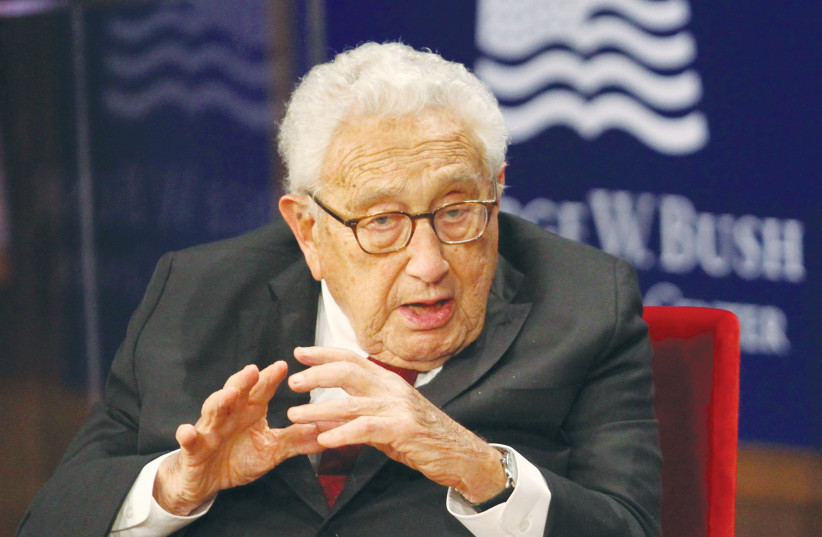On June 2, exactly one week after Henry Kissinger’s 100th birthday, The Jerusalem Post published an op-ed by Dore Gold, Israel’s former ambassador to the UN. He aptly and quite pointedly characterized Kissinger as a “polarizing figure.”
And yet, Gold then inexplicably hastened to adulate Kissinger as one who could “today” still “provide the glue that could bond the NATO members and help create an enduring peace... for Europe.” I, respectfully, beg to differ.
Indeed, Kissinger recently waffled quite awkwardly – no, embarrassingly – about how to best address the raging conflagration in Ukraine. So, here are some other underlying reasons to take issue with Gold’s homage to Kissinger.
To salute Kissinger’s 100th birthday (May 27, 2023), a high-ranking Chinese diplomat somewhat breathlessly declared: “When Kissinger talks about the world situation and China, which he still regularly does, we should listen to him with veneration and attention.”
Say what? “With attention?” Well now, Kissinger unquestionably merits enormous attention. But, “with veneration?” Most assuredly not, at least if judged by virtually every international standard of unabridged, unjaundiced and uncompromising humanitarian concern and conduct.

The accomplishments, sins, and failures of Henry Kissinger
In truth, Kissinger was an exceptionally deft diplomat. He is widely and justifiably acknowledged as such. That is the worldly astute, diplomatically polished and geopolitically shrewd side of Kissinger. On the occasion of Kissinger’s 90th birthday party, senator John McCain gushed: “I know of no individual who is more respected in the world than Henry Kissinger.”
But wait! Kissinger was no saint. Neither was he a knight in shining armor as he jousted around the globe with those he wittingly, willfully and often wantonly deemed to be America’s adversaries. Indeed, Kissinger’s spectacular – no, absolutely awesome – achievement in opening China to diplomatic relations with the US is, to the mind of many, the apogee of Kissinger’s lengthy diplomatic career.
Regrettably, that pinnacle was – in the full context of Kissinger’s decades of diplomatic escapades – often paralleled by comportment that not only flouted, but also fell to the very perigee of the democratic and humanitarian values for which America seemingly stood and presumably still stands.
In that regard, The Guardian (the UK’s renowned daily newspaper) chose Kissinger‘s 100th birthday to lambaste him because he “masterminded illegal bombings in Laos and Cambodia and enabled genocide in East Timor and East Pakistan.”
Almost simultaneously, an American cable news station (the rabidly liberal MSNBC) blistered Kissinger for his “support for brutal dictators, brutal regimes, brutal wars and war crimes.”
LIKE IT or not, the thrust of Kissinger’s actions must, and can only be properly understood, when viewed through the prism of his predisposition to address international affairs from a Machiavellian perspective, otherwise known as “realpolitik.”
Simply explained, realpolitik is the conduct of diplomatic and/or political affairs that, in direct contradiction to widespread moral and ethical principles, is primarily predicated upon unabashedly existential (read: amoral) considerations. As such, realpolitik is untethered from ideological, socio-cultural and/or religious notions of what may be deemed to be right and wrong.
Conversely, realpolitik is the pragmatic and (arguably) existentially realistic approach to dealing with political affairs. In short, realpolitik is the practice of expedient (and, when necessary, even coercive) realism. Quite pointedly, that unvarnished realism is devoid of the constraints otherwise imposed by the canons of ethics or the strictures of unadulterated morality. Clearly then, realpolitik is the practice of amorality, be it in politics or geopolitics. Indeed, realpolitik unhesitatingly and unapologetically actualizes pure power to effectuate its perceived goals.
As such, Kissinger may well have been the 20th century’s foremost practitioner of realpolitik. It is precisely in that regard that the US’s, the CIA’s and Kissinger’s opprobrious involvement in Argentina, Chile and across the cone of South America come to mind.
More pointedly, Kissinger was – as uncontroverted documentation attests – “inextricably involved” in what became known as “Operation Condor.” That was a United States-backed campaign of wantonly ruthless oppression coupled with widespread state terrorism.
That malevolent operation, which existed from 1968 to 1989, involved CIA-backed coup d’etats, assassinations of left-wing leaders in South America, the murders of between 60,000-80,000 people, plus the contemptible incarceration of some 400,000 political prisoners. No discussion of Kissinger is complete without reference to the loathsome and execrable conduct epitomized and concretized by Operation Condor.
One odious example must suffice. It was thus that in a White House meeting on September 15, 1970, national security advisor Kissinger expressed no moral qualms when president Nixon ordered a military coup that ultimately led to the death of Chile’s democratically elected president and the murder of Chilean army commander-in-chief, Gen. Rene Schneider. Those events were a perversion of everything that America claimed it stood for. Incredulously, Kissinger denies that he was informed about, was complicit with, or in any way authorized those abhorrent activities!
Premises considered, far be it for this relatively unheralded geopolitician to besmirch the greatness of a man who was awarded the Nobel Peace Prize for his efforts in ending the “American War” in Vietnam. On the other hand, Kissinger was hardly one to dodge the prospective acquisition of greatness. He consciously and vigorously sought to scale that estimable mountain top. In retrospect, perhaps Kissinger should have been better attuned to the sage counsel of Abu Bakr, Muhammad’s closest adviser: “Run away from greatness and greatness will follow you!”
In sum, may Kissinger live to 120. In so doing, history will have yet another generation to properly adjudge the true level of Kissinger’s greatness. That judgment will either be to Kissinger’s own eager applause or to his scowling denunciation.
The writer is the director of the Center for Strategic Geopolitics in Birmingham, Alabama. He lectures globally on world affairs.
